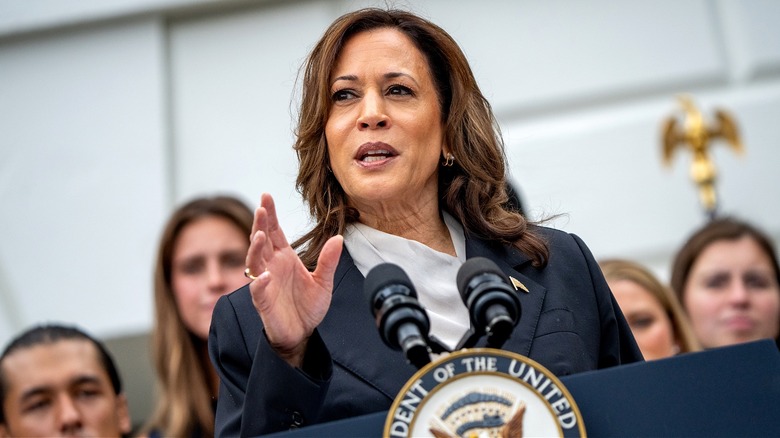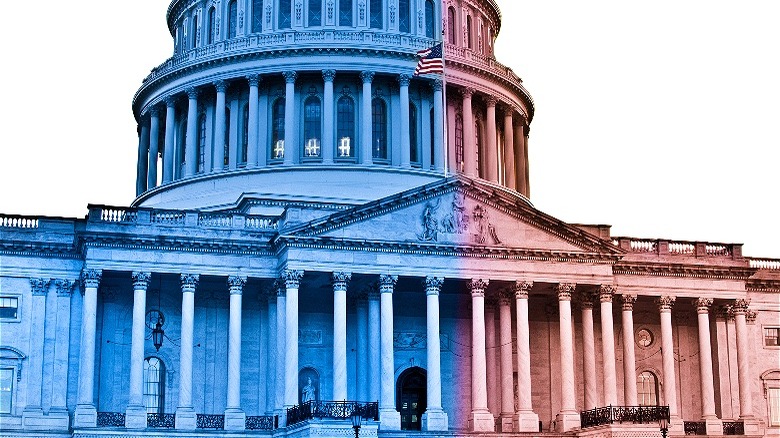What Might Happen To Social Security If Kamala Harris Wins The Presidency
With a new candidate in the 2024 presidential race, and renewed energy among Democrats (best seen in Kamala Harris' record-breaking fundraising efforts), the presidential election is experiencing a second wind. Even though there are less than 100 days left until the election, there are still a lot of unanswered questions regarding Harris' policies as a presidential candidate. While Harris has made her stance on certain policies, like women's reproductive rights, crystal clear, other topics have yet to be addressed. Perhaps one of the most significant issues for voters looking to the future is Harris' proposed stance on Social Security.
For anyone who might not know, the country's Social Security is heading for a funding cliff. This means millions of beneficiaries and workers who pay into Social Security could face cuts or even the elimination of the program (and its benefits) altogether. While there have been many potential ideas for tackling Social Security's upcoming funding issues, nothing has been put into place just yet. This means the policy of the new president (as well as the political makeup of Congress) could have a significant impact on the future of the program.
The current Social Security problem explained
While you've probably experienced payroll deductions on your paychecks, that money is only one part of Social Security's total income. Social Security has two trust funds in the U.S. Treasury that pay out retirement, survivor's, and disability benefits. Social Security taxes as well as interest income are put into these accounts in order to pay out benefits. However, as increasing amounts of people qualify for benefits (such as the silver tsunami of baby boomers retiring), these trust funds are slowly being drained as costs exceed income. This creates a drain on not just funds but also future earned interest due to the lack of leftover money to invest.
Despite a recent announcement that Social Security's coffers actually had an entire extra year of funding than previously thought, the program is still due to run out of its reserves in 2035. At that point, Social Security would only be able to pay out about 83% of its full scheduled benefits. This means that the over 70 million recipients of Social Security benefits (both retirees and those on disability) would face a shortfall in how much they could expect to receive every month.
However, despite this looming cliff, Congress has failed to act. Commissioner of Social Security, Martin O'Malley, even said, "I will continue to urge Congress to protect and support Social Security and restore the growth of the funds," adding, "Whether Congress chooses to eliminate the shortfall by increasing revenue, reducing benefits, or some combination, is a matter of political preference, not affordability."
The political divide over Social Security
It's important to realize that neither side of the political aisle can agree on how best to solve the Social Security funding cliff. It's also important to realize that even though Kamala Harris hasn't yet put out her specific policy points, her stance is more than likely going to be in keeping with not just her former running mate and the current president, Joe Biden, but also the Democratic Party as a whole.
In recent years, the divide between Democrats and Republicans with regard to how each wants to handle the funding issue at the heart of Social Security has grown considerably. President Biden has previously supported higher taxation on individuals earning more than $400,000 as a way to extend the financial solvency of Social Security. Most importantly, Biden, and Democrats in general, have opposed benefit cuts and plans to privatize any element of the existing programs.
On the flip side, the GOP has pushed for cost-cutting measures like postponing the age to receive full benefits and even cutting benefit amounts altogether. According to the 2023 Republican Study Committee's Blueprint to Save America proposal, Republicans aim to delay full retirement age until 69 years old (or older), cut disability benefits while removing "incentives to leave the labor force," and eliminate Medicare's ability to negotiate prescription drug prices. (On that note, here's what could happen to Social Security when Gen X retires.)


